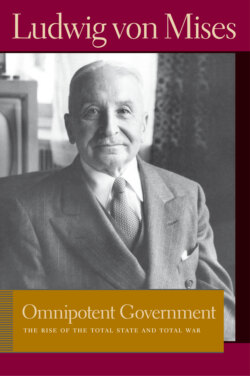Читать книгу Omnipotent Government - Людвиг фон Мизес - Страница 10
На сайте Литреса книга снята с продажи.
II
ОглавлениеThe present crisis of human civilization has its focal point in Germany. For more than half a century the Reich has been the disturber of the peace. The main concern of European diplomacy, in the thirty years preceding the first World War, was to keep Germany in check by various schemes and tricks. But for German bellicosity, neither the Czars’ craving for power nor the antagonisms and rivalries of the various nationalities of southeastern Europe would have seriously disturbed the world’s peace. When the devices of appeasement broke down in 1914, the forces of hell burst forth.
The fruits of the victory of the Allies were lost by the shortcomings of the peace treaties, by the faults of the postwar policies, and by the ascendancy of economic nationalism. In the turmoil of these years between the two wars, when every nation was eager to inflict as much harm on other nations as possible, Germany was free to prepare a more tremendous assault. But for the Nazis, neither Italy nor Japan would be a match for the United Nations.2 This new war is a German war as was the first World War.
It is impossible to conceive the fundamental issues of this most terrible of all wars ever fought without an understanding of the main facts of German history. A hundred years ago the Germans were quite different from what they are today. At that time it was not their ambition to surpass the Huns and to outdo Attila. Their guiding stars were Schiller and Goethe, Herder and Kant, Mozart and Beethoven. Their leitmotiv was liberty, not conquest and oppression. The stages of the process which transformed the nation once styled by foreign observers as that of the poets and thinkers into that of ruthless gangs of the Nazi Storm Troops ought to be known by everybody who wants to mold his own judgment on current world political affairs and problems. To understand the springs and tendencies of Nazi aggressiveness is of the highest importance both for the political and military conduct of the war and for the shaping of a durable postwar order. Many mistakes could have been avoided and many sacrifices spared by a better and clearer insight into the essence and the forces of German nationalism.
It is the task of the present book to trace the outlines of the changes and events which brought about the contemporary state of German and European affairs. It seeks to correct many popular errors which sprang from legends badly distorting historical facts and from doctrines misrepresenting economic developments and policies. It deals both with history and with fundamental issues of sociology and economics. It tries not to neglect any point of view the elucidation of which is necessary for a full description of the world’s Nazi problem.
